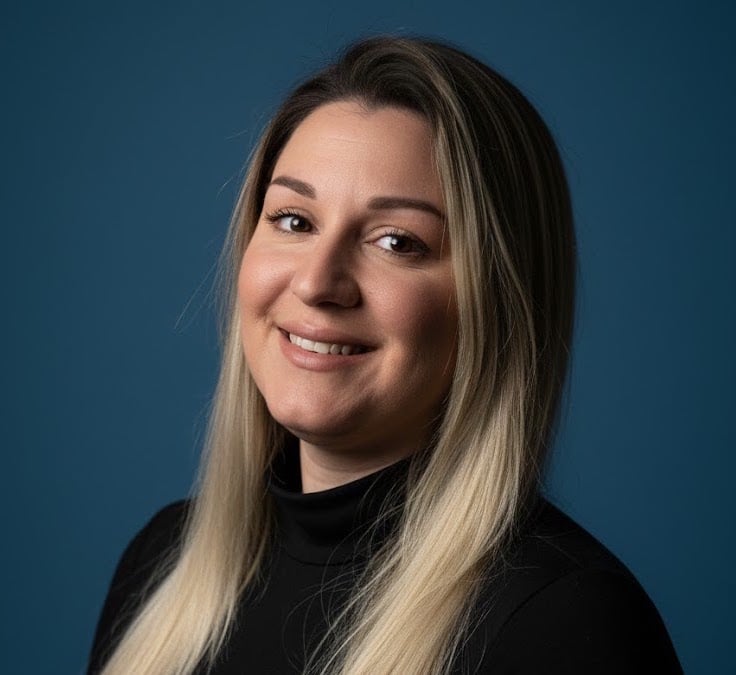
In this exclusive interview, Anna Radulovski, Founder and Global CEO of WomenTech Network, sat down with Catherine McCourt, EY Global Technology Consulting Leader, to discuss her journey into technology, her leadership philosophy, and the evolving role of leaders in the AI-driven era.
With a career spanning continents and industries, Catherine shares valuable insights into building high-performing teams, fostering diversity, and navigating the challenges that come with leadership. She also reflects on pivotal career moments, the importance of mentorship, and how companies can create more inclusive environments to support women in tech leadership.
Read along as Catherine’s leadership journey unfolds in this interview, revealing her thoughts on the future of technology and the advice she’d offer to her younger self.
Breaking Into Tech Without a Map
Catherine McCourt: I started in the early 90s, technology was really just in its infancy. We didn’t have PCs, people didn’t carry laptops, mobile phones weren’t really a thing—although they were just coming in, but they were the size of bricks. By the time I graduated, the way we were learning had completely changed—search engines became a thing, and I realized pretty quickly that I needed to get into this. My plan was never to go into a technology-related role. I studied business and economics, with psychology as well, because I loved the people aspect. But when I finished university, I realized that technology was going to fundamentally change the way businesses operate. My first role was at HP Software, working with IT executives. I remember one of them asking me about the architecture of a solution, and I didn’t even know what ‘architecture’ meant! That was a wake-up call for me—I had to learn quickly, and the more I learned, the more fascinated I became.
Leadership Journey Evolution: Building Trust, Empathy & Adaptability
Catherine McCourt: My leadership style has evolved as I have matured. And as I've evolved as a human, as a colleague, and as a person in the workplace. I think for me, it’s been a series of steps that I’ve enjoyed taking, and with each step, I’ve taken on more and more responsibility. And with that responsibility, you have bigger teams, bigger financial responsibilities, and a much bigger moral responsibility, because within consulting, your role is to look after those people—to make sure they have the right work, that they’re learning, keeping their skills up to date, and that there’s enough work to keep them engaged.
Leadership comes with a huge amount of responsibility, and I think every step I’ve taken has been intentional. It’s not just about leading—it’s about earning trust. In a consulting business, we are a people-based organization, and leadership is about creating an environment where people feel they belong. I don’t believe leadership is something you get purely out of a job title. You have to earn respect, trust, and loyalty. Being able to listen and actually seek to understand is very important. In diverse groups, you might have one person who thinks everything is perfect, and another who feels the exact opposite. You have to create an environment where everyone is comfortable sharing their perspectives. You can’t assume that one leadership style fits all—every individual is different, and as a leader, you have to take the time to understand that.
A Pivotal Career Moment: Stepping Up Under Pressure
Catherine McCourt:One of the biggest projects I ever worked on was for a major health insurance client. It was a huge, multi-year, $100 million transformation project. Just four weeks into the project, the project manager—who was also a senior partner and my second-in-command—left the organization. It was an unexpected and difficult situation, and I had to step into that leadership role immediately. I knew very quickly that the only way I would be successful—and the only way the project would succeed—was if I developed the team around me. There was a significant leadership gap, and I didn’t have the luxury of time to hire externally. I had to build trust, develop people’s skills, and create a high-performing team under immense pressure. It was a crash course in leadership, and I learned how to remain calm, make tough decisions, and bring people together to navigate uncertainty.
Mindset Over Résumés: Building High-Performing Teams That Thrive
Catherine McCourt: I don’t always prioritize the person with the strongest technical skills. For me, mindset, openness, and the ability to collaborate are far more valuable—especially in consulting, where skills evolve rapidly. I build teams that are diverse in background, thought, and experience, and I test for collaboration and energy in interviews. The best teams I’ve led are the most diverse ones. Mindset and willingness to unlearn and relearn are essential. I’ve learned that people who are adaptable and open to feedback consistently outperform those with fixed skill sets. It’s not just about finding talent, it’s about cultivating it into something greater than the sum of its parts.
Managing Stress & Avoiding Burnout
Catherine McCourt:I have a few fundamental rules. Sleep is non-negotiable—it’s one of the biggest factors in maintaining mental and physical health. If you consistently undersell yourself on sleep, you’re no good to anyone. Exercise is another key priority for me—I make sure to move my body daily. Whether it’s running in the morning or after work, it helps clear my mind. Nutrition also plays a big role. If you’re not in good physical shape, it’s much harder to maintain mental resilience. I also make it a point to unplug on weekends as much as possible. And I have a strong support network—family, friends, and mentors who provide perspective. There were moments in my career when I reached out to mentors for advice, and sometimes just talking to someone outside the immediate pressure zone helps you see things more clearly.
The Future of Leadership in the AI Era
Catherine McCourt:AI will automate a lot of tasks, but what it can’t replace is human connection. The leaders who will thrive in this era are those who can combine technical understanding with human-centric skills—empathy, listening, storytelling, and the ability to build trust. Mindset is also crucial. Technical skills will always evolve, but having a growth mindset—the ability to unlearn and relearn—will set great leaders apart. I believe that consulting will never be fully automated, because at the end of the day, businesses need people who can explain, persuade, and guide them through transformation
Women in Tech Leadership & The Power of Allies
Catherine McCourt:We’ve made progress, but I do worry that in some parts of the world, we’re seeing reversals. The biggest challenge isn’t just getting women into tech—it’s retaining them. Many women leave mid-career due to inflexible policies, lack of mentorship, or workplace cultures that don’t support them. Companies need to offer real solutions, like flexible work arrangements and structured leadership development programs. Male allies are also critical. If we want to drive real change, we need male leaders to advocate for women, call out biases, and actively sponsor female talent. It’s not enough to just mentor women—we need men in leadership to create pathways for them to advance.
Mentorship as a Two-Way Street
Catherine McCourt: I’ve had mentors throughout my career—some internal, some external—and the best ones have been those who were brutally honest with me. You don’t need someone to just tell you you’re doing great. You need someone who’s seen you in action, knows your blind spots, and gives you the kind of feedback that helps you grow. I also practice reverse mentoring. Some of the best strategic insights I’ve had recently came from junior team members. They offer a completely different lens—and as a leader, I want to understand how every generation in the firm thinks, not just my own peer group.
Advice to My Younger Self
Catherine McCourt: I would tell myself to be more confident and say yes to more opportunities. Early in my career, I sometimes hesitated to go for roles because I thought I wasn’t ready. But what I’ve seen over time is that the people who step up—often less qualified—are the ones who get the opportunities. I would remind myself to back myself more, take more risks, and trust that I would figure things out along the way.
Catherine McCourt’s leadership journey highlights the power of adaptability, trust, and continuous learning in today’s fast-changing tech landscape. From building high-performing teams to fostering diversity and navigating the AI-driven future, her insights provide valuable lessons for aspiring leaders.
If this leadership story was enlightening, you might be the perfect fit for a career at the EY organization. Explore opportunities on the EY dedicated job board and take the next step in your professional journey. To gain more of Catherine and other top executives’ insights, join us at the Women in Tech Global Conference.
Catherine McCourt will be speaking at the Women in Tech Global Conference 2025, on "Empowering Change: AI as a Force for Environmental and Social Good" to present how EY is involved in using AI to accelerate social impact and shape the future with confidence.
The views reflected in this article are the views of the author and do not necessarily reflect the views of the global EY organization or its member firms.





















